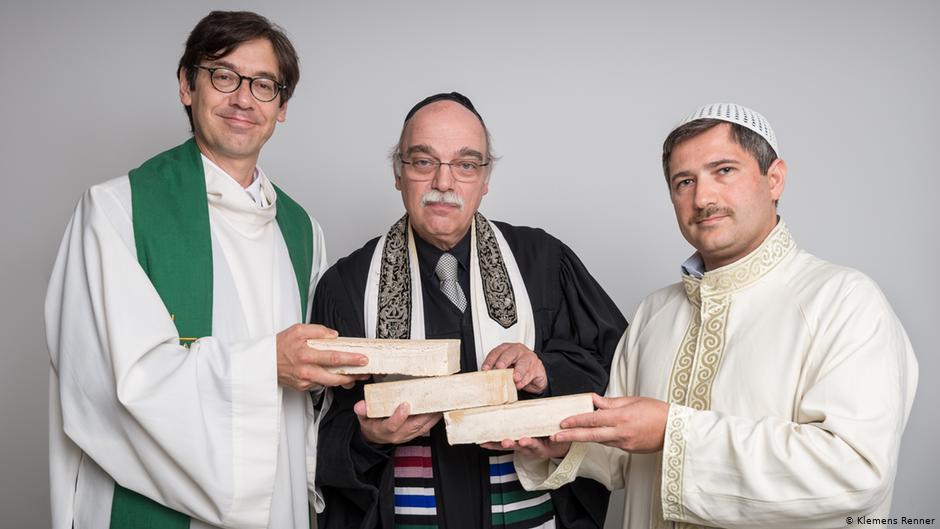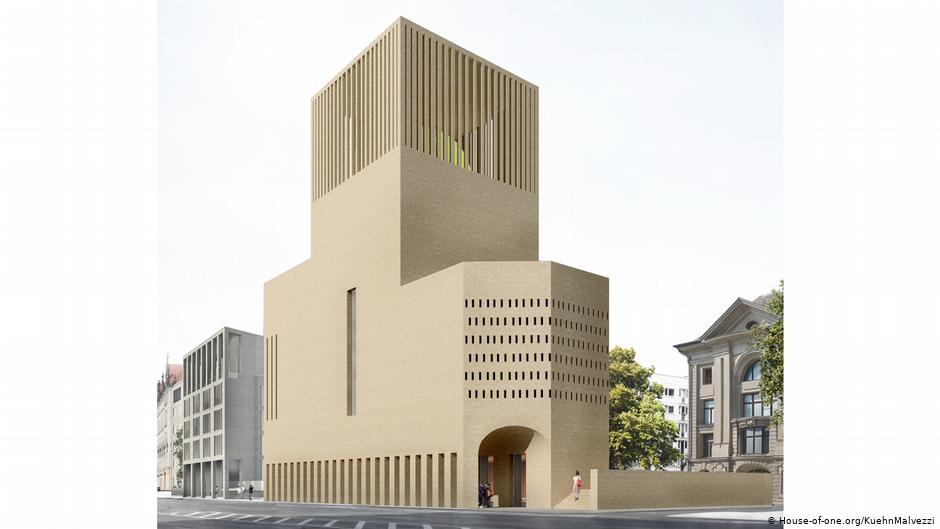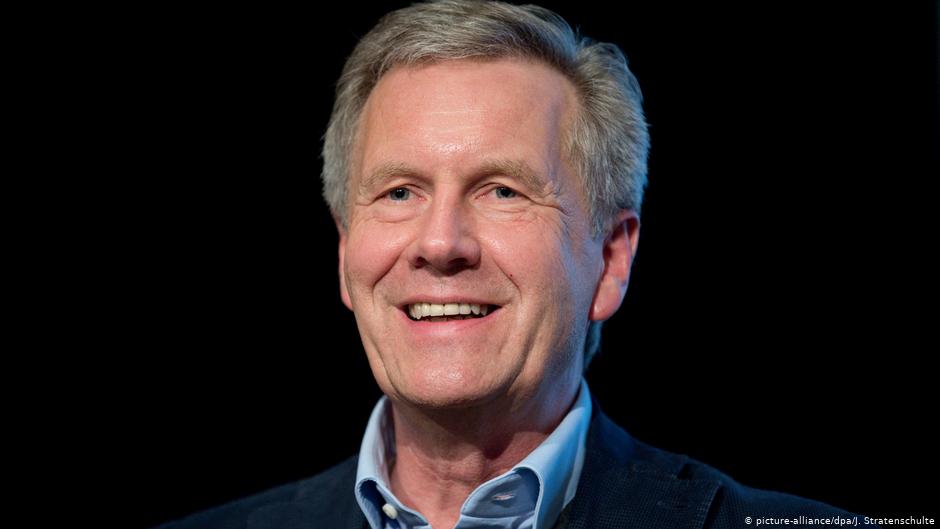"We are in dire need of a culture of dialogue"

The diggers will soon be rolling. For more than ten years the idea of a joint venue representing the three monotheistic religions – Judaism, Christianity and Islam – has been planned, discussed and promoted in Berlin.
Roland Stolte, administrative director of the "House of One" foundation, announced that the excavators are to start digging the foundations in just over two months, in January 2021. Thus, after some delays, most recently due to the coronavirus pandemic, the project in the heart of old Berlin is finally getting underway.
Stolte spoke at the first meeting of a 20-member board of trustees of the "House of One" foundation, which was chaired by Mayor Michael Muller (SPD). In addition to prominent representatives of the three religions, the 20 members include outstanding representatives of Berlin's cultural scene: the general manager of the Humboldt Forum, the director of the Jewish Museum, the director of the Deutsches Theater, the president of the Prussian Cultural Heritage Foundation, the director of the House of World Cultures. An unusual occurrence in the German capital, where religion and culture rarely have much contact.
"Where, if not here?"
Mayor Muller was "very enthusiastic about the idea" of the interfaith project. "Where, if not here?" he said. The "House of One" would enrich the city "greatly" as an opportunity for interaction and dialogue.
The project, the only one of its kind in the world, is located at the heart of the city, where the six-lane Leipziger Strasse between Alexanderplatz and Potsdamer Platz has been passing construction fences and wasteland for years. Once upon a time, this was the very centre of old Berlin, the place where the Petrikirche, important for the history of early Berlin, stood for over 700 years.

The prestigious building in the centre of Berlin will offer three rooms around a central meeting place. Towards the top, the building will rise 40 metres into the sky and thus be a symbol of togetherness.
Over the next five years, the archaeological remains of this place of worship will be transformed into a shared complex for Christians, Jews and Muslims, with a church, synagogue and mosque. Three rooms around a central meeting place. The building is to rise 40 metres into the sky, thus becoming a symbol of fellowship. The planned construction costs amount to 43.5 million euros and have already been largely secured.
Aftermath of bloody attacks
The board of trustees meeting took place virtually, "there was no nice setting, no reception," as Muller said. "But we didn't want to postpone it forever." Numerous short statements by members of the board of trustees revealed the urgency of the situation. Thoughtful contributions reflected equally on global conflicts and on the attacks in Dresden, Paris and Nice, where young Islamists murdered at random. Director of the Catholic Academy in Berlin, Joachim Hake, pleaded for genuine and open dialogue between the religions in friendship: "In view of the intensification of identity politics, we are in dire need of a culture of dialogue."
The Islamic theologian Mouhanad Khorchide from Munster hopes for theological impulses that would steer Islam away from its claim to exclusivity. Imam Kadir Sanchi of the "House of One" said that Muslims have a particular responsibility. Their religion has been "instrumentalised". The House of One wants to protect young people from extremism and promote preventive work. "We set mutual respect and charity against terror and violence," said the Berlin Rabbi Andreas Nachama, the most important Jewish cleric in the project.
Worldwide attention for the project
The building still only exists as a model. But international partnerships have been running for a long time. There is a regular exchange to Bangui in the Central African Republic, where Christians and Muslims are planning a similar religious house. Talks are also being held with an academy in Tbilisi, Georgia, and with the Technical University of Haifa on a "Garden of One" in the Israeli port city. Imam Kadir Sanchi spoke of local and national, but also international aspects of the "House of One".
Khorchide expressed his conviction that Berlin's religious coexistence could also strengthen dialogue-oriented forces on the Arab peninsula. According to Hamideh Mohagheghi, the Tehran-born religious scholar from Paderborn, projects like the "House of One" offer "indispensable spaces and ideas for cooperation between religions and world views."
The most prominent political representative on the committee is former German President Christian Wulff. He coined the phrase ten years ago that Islam belongs to Germany. Now he emphasised the importance of the Berlin concept that "no religion lose any of its claim and value", adding that the focus was nevertheless on finding common ground, not about what separates us.

The ex-president and the Pope
Wulff, who was a guest of Pope Francis in the Vatican barely two weeks ago, at the same time promoted the Pontiff's encyclical "Fratelli Tutti", which essentially deals with the relationship between the world religions. According to the Pope, it was the first encyclical letter ever to have been inspired by a Muslim, the Grand Imam of Al-Azhar University, Ahmed al-Tayyeb.
The Catholic Wulff looked back on his own childhood. "As a small boy, one had the feeling that God loved Catholics a little more." Now the Pope said "surprisingly for many Catholics, God feels the same love for every person", regardless of religion.
With the construction work in progress, the initiators hope to see increased interest in the city and more international connections. The foundation stone for the new building on old ruins is to be officially laid at the end of next May.
Horror after the attack in Vienna
On the next morning, the day after the terror of Vienna. Rabbi Nachama and Imam Sanci, two of the three founders of the "House of One", spoke to Deutsche Welle. Nachama called the event a "lament" and then referred to the news situation, which remained unclear until late into the night: For a long time it was uncertain "whether it was a jihadist or an extreme right-wing attack" on the synagogue or the city centre. "It's crazy, but jihadist and right-wing extremist terror are the same in terms of the sequence of events. Both have the same goal: to attack free societies.
Looking back at the attacks of the past weeks in Dresden, Paris and Nice, Sanci expressed his dismay. "We can't find words and need a few minutes. Moments of silence. Then we find ourselves together." The common prayer is also a way of "shouting out against these inhuman deeds."
Mosques, synagogues, churches are places of worship, they are inviolable and must be protected, he says. "Every single person is also a house of God. He is untouchable, regardless of religion or worldview." For him the latest attacks, now in Vienna, were "attacks on God. What a contradiction: in the name of God people attack God."
© Deutsche Welle 2020
